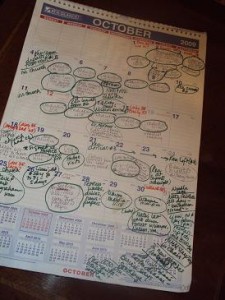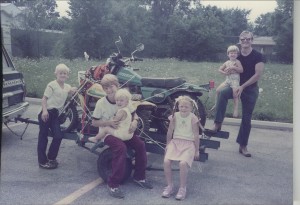Every November I buy a new calendar, and last week I did it again. What will be written on the 2010 calendar by the time we come to next November buying the 2011 calendar? Time marches relentlessly on.
Last week I talked with our children about the two months immediately past, with my current calendar in front of me. My purpose was to use a green marker to highlight everything that happened to Nate from the September 22 discovery of his cancer to his November 7 funeral. While we were living those six weeks, the days were so full we didn’t have time to write everything down.
The kids and I went back to those tumultuous days and recalled details. “That was the day we found out. That was the day he had the big scan. That was the day he fell for the first time. That was the day his friend visited. That was the day we started with Hospice.” On and on we talked while I wrote all over the little squares on my calendar. It felt like we were honoring Nate’s suffering by recording the details of his decline in indelible ink.

One day about half way through the six weeks of cancer, I remember saying to Nate, “You’re not the only one with a death sentence. We’ve all got one. It’s just that we can see yours on the calendar, and for the rest of us, it’s still written in invisible ink.”
Each year when I buy a new calendar, I put the old and new together on a table and flip the pages, recording significant birthdays with an orange pen. “Luke, 38. Emily, 37.” Adding one more year as I write each name on the 2010 calendar is a sharp reminder of our inability to stop time. Nate used to tap the glass on his watch with his index finger and say, “Nobody beats this guy.”
All of us are given 24 new hours every morning except for that one morning (known only to God) when each of us will be given less. For Nate, that morning was November 3. He was given only until 7:35 pm, which was when time ran out for him. Back in September or even October, none of us knew that day or that hour, but now we all know it. Likewise, none of us knows the day or hour when time will run out for us, but it is known God.
Most of Nate’s battle with cancer took place in October. At the beginning of September, when I’d flipped ahead to October to see what was coming, there was no green ink. As a matter of fact, not having a child in school for the first time in 36 years, we were unbound by any rigid schedule and had begun planning our first trip away from our newly emptied nest. The only hindrance was Nate’s painful back, so our trip was going to be close and short, to Greenfield Village near Detroit.
Little did we know our October trips would all be in the other direction, from our tiny little Michigan town to Chicago’s Loop for doctor appointments, medical tests and radiation treatments. We never made it to Greenfield Village. Although our calendar was packed with activity, none of it was planned by us or known ahead of time.
As I look at my new 2010 calendar, its pages clean and white, I wonder what will be written on its squares. As Mom used to say, “Only God knows, and he won’t tell.” The only way to move from one calendar to the next without being swamped with anxiety is to consciously put every little square under the control of the omniscient God. Since he already knows what will be on the calendar, it’s best to put him in charge.
“The length of our days is seventy years—or eighty, if we have the strength; yet their span is but trouble and sorrow, for they quickly pass, and we fly away. For a thousand years in thy sight are but as yesterday when it is past, and as a watch in the night. O satisfy us early with thy mercy; that we may rejoice and be glad all our days.” (Psalm 90:10, 4, 14)


